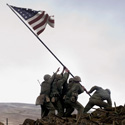
Flags Of Our Fathers
directed by Clint Eastwood
starring Adam Beach, Ryan Phillippe, Jesse Bradford, Barry Pepper
Paramount
Just in case an artillery blast or some other explosion might separate him from his dog tags, my grandfather, an Osage Indian and a Navy Seabee, had his social security number tattooed on his forearm before shipping out to the South Pacific. His brother-in-law, a Marine, was the only member of his squad not wounded or killed in a battle on the island of Saipan. His other brother-in-law served in the Army, and saw action in both the European and Pacific theaters. Each returned home to south Kansas after the war. They received a brief hero’s welcome from their family and friends; then they put away their uniforms and quietly went back to their lives.
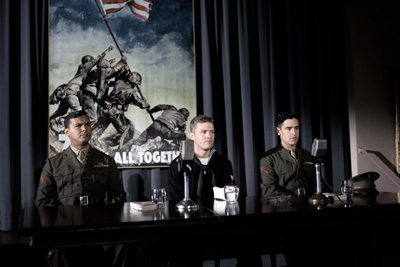
Clint Eastwood’s latest compelling film, Flags Of Our Fathers, is a true story about three other men, two Marines and a sailor, who were not afforded the opportunity to quietly reconcile their overseas experiences with stateside life. Instead, they were thrust into the spotlight as the “Flag Raisers of Iwo Jima.”
Flags Of Our Fathers is essentially an expanded version of the almost-forgotten 1961 movie about Ira Hayes, The Outsider. It focuses on Hayes, a Pima Indian paratrooper (played by Adam Beach), and the other two surviving flag raisers as they are ordered on a much-needed war bond tour (the government is nearly bankrupt) after AP photographer Joe Rosenthal’s photo of them becomes an inspiring symbol of America’s struggle in WWII.
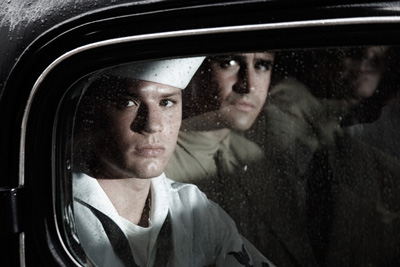
Much to some politicians’ and bureaucrats’ consternation, Hayes, Navy Corpsman John “Doc” Bradley (Ryan Phillippe), and PFC Rene Gagnon (Jesse Bradford) are very uncomfortable with the tag of “hero.” They’ve left too many dead friends behind, including fellow flag raisers PFC Frank Sousley, (Joseph Cross), PFC Hank Hansen (Paul Walker), PFC Harlon Block (Benjamin Walker), and their much-admired sergeant, Mike Strank (Barry Pepper).
While they’re wining and dining, giving speeches, and forced into such absurdities as climbing a papier-mache model of Mount Suribachi in the middle of Chicago’s Soldier Field, they’re haunted by memories of the battle, and of their fallen comrades.
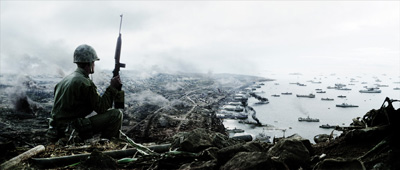
The most psychically damaged of the trio is Hayes, who deeply resents his current mission; he wants to go back to his remaining buddies. He’s grief-stricken by the particularly gruesome death of his best friend on Iwo Jima, and suffers on an hour-by-hour basis the casual racial slurs tossed his way by people who want to shake his hand. Throw in a lot of free drinks, and Hayes quickly descends into a drunken hell decades before Post Traumatic Stress Disorder became acknowledged.
On the other hand, Gagnon, with his good looks and pretty fiancée, begins to realize financial possibilities associated with his new-found fame. In the middle of the two is Bradley, the stereotypically selfless combat medic who, when wounded in the legs on Iwo Jima, crawled to the aid of a fallen Marine. He exhibits the same qualities Stateside; Phillippe is quietly stellar as his character battles his own demons while propping up Hayes.
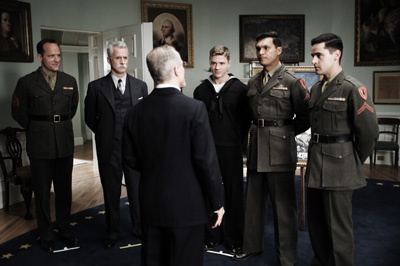
The gritty, horrific battle sequences and the War Bond tour are nicely woven together by Bradley’s son, James, as he interviews those who served with his Navy Cross-earning father. These interviews would become the basis for a best-selling book, Flags Of Our Fathers, which was adapted for the film by William Broyles, Jr. (Cast Away) and Paul Haggis (Million Dollar Baby, Crash).
Before seeing the film, one might be tempted to dismiss Flags as a Pacific version of Saving Private Ryan – after all, Steven Spielberg co-produced it, and Pepper played the devoutly religious sniper in Ryan. Ultra-realistic, grey-toned battle footage aside, though, Flags has all the earmarks of an Eastwood movie. Reverent but contemplative, Flags questions the propaganda machines behind all wars – justified or not. While this film is every bit as patriotic an epic as The Longest Day or Sands of Iwo Jima, it sure as hell isn’t a John Wayne vehicle. In terms of poignancy and setting, Flags more closely resembles William Wyler’s all-time classic, The Best Years of Our Lives.
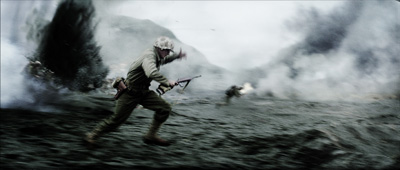
Eastwood subtly prompts us to think about the overused term of “hero,” and how it just might be used as a psychological device of sorts, to absolve some of those who utter it of having to really think about the consequences of sending others off to war. The director also does an admirable job of illustrating ugly racism; in one pivotal scene, Hayes, in uniform, battles policemen in the street after being thrown out of a bar that doesn’t serve Indians.
Which brings me to a Native Canadian, Adam Beach (Smoke Signals), a terrific actor whose gut-wrenching performance should garner an Oscar nomination. He’s played an Indian Marine before, in Windtalkers. But Beach’s Ira Hayes is a completely different soldier, a different man – and certainly not a stereotype. His portrayal of a profoundly tormented veteran – who would become a folk hero after his tragic death – will have some viewers wiping their eyes.
Adding this must-see creation to his lengthy resume, Eastwood has now contributed more to society as a director than as an actor; that is certainly saying something. His cinematic companion to Flags, the Battle of Iwo Jima recounted from a Japanese perspective, will be released next year.
I thought an awful lot about my grandfather and my great-uncles during Flags’ screening – about what they might have seen, what they might have done. This haunting film is sure to provoke a lot of similar thoughts in many, many others; while most of those who returned from World War II, including these three men, have since passed on, they’ve left so many family members behind to wonder.
Flags Of Our Fathers: http://www.flagsofourfathers.com












